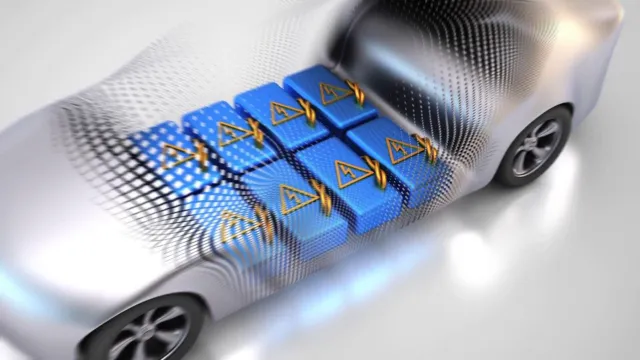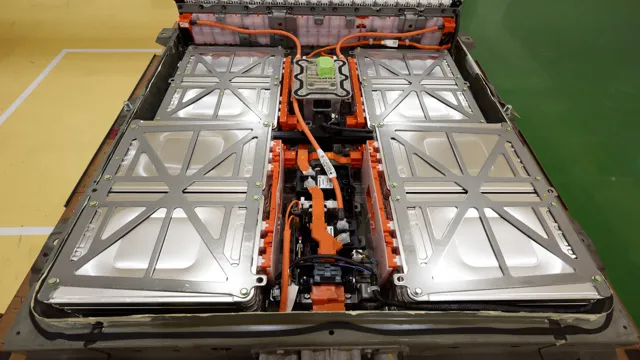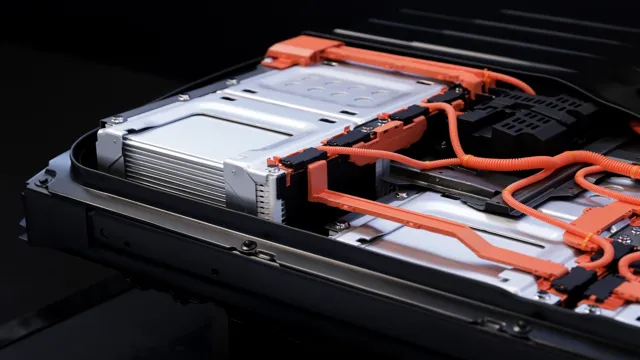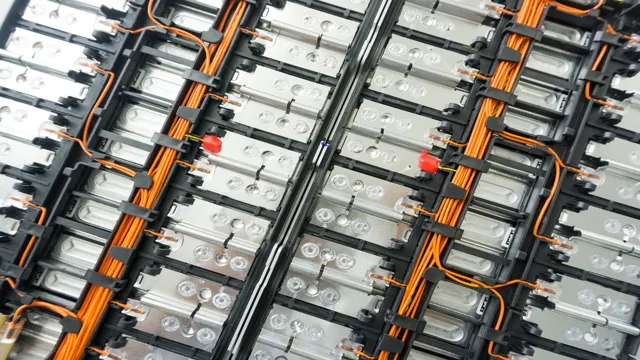Rev Up Your Knowledge: Debunking the Myth of Electric Cars Needing Constant Battery Replacements
Electric cars are becoming increasingly popular as people look for ways to reduce their carbon footprint and save on fuel costs. However, one concern that potential electric car owners may have is whether or not these vehicles require new batteries. After all, replacing an entire battery pack can be expensive – not to mention time-consuming.
So, do electric cars need new batteries? In short, the answer is yes and no. While electric car batteries do degrade over time, they can also be maintained and sometimes even replaced in part. In this blog post, we’ll explore the lifespan of electric car batteries, what factors can impact their longevity, and what options are available for those looking to maintain or replace their battery packs.
Whether you’re already an electric car owner or considering purchasing one, read on to learn more.
Introduction
If you’ve been considering making the switch to an electric car, one of the questions that may be weighing on your mind is whether or not electric cars need new batteries. The good news is that, for the most part, electric car batteries are designed to last for many years of driving. In fact, many manufacturers offer generous warranties on their battery packs, giving owners peace of mind that they won’t need to replace them anytime soon.
Of course, as with any vehicle, there are certain factors that can impact the lifespan of an electric car battery. These include things like extreme temperatures, driving habits, and overall usage patterns. However, with proper maintenance and care, most electric car owners should be able to get many years of reliable use out of their battery before needing to consider a replacement.
And when that time does come, rest assured that there are options available for recycling and properly disposing of old batteries in an environmentally friendly way.
Brief overview of electric cars and how they work
Electric cars have been gaining popularity in recent years. Unlike traditional cars, they use an electric motor powered by rechargeable batteries instead of an internal combustion engine. Electric cars convert electrical energy stored in the battery into mechanical energy to move the wheels and provide power to the car’s various systems.
They are more eco-friendly and have fewer carbon emissions than traditional gas-powered cars. One of the main advantages of electric cars is their efficiency because they use almost all the energy stored in the battery to power the car, while traditional cars often waste a lot of energy due to inefficiencies in the engine. Overall, electric cars present an exciting innovation in the automobile industry, and with more research and development, they have the potential to revolutionize the way we drive.

Electric Car Battery Lifespan
If you’re considering purchasing an electric car, you might be wondering about battery lifespan – do electric cars need new batteries? While it’s true that electric car batteries will eventually degrade over time, they’re built to last a long time. In fact, many electric car manufacturers offer warranties on their battery packs that last up to 8 to 10 years. Additionally, advances in battery technology have made them more durable, and it’s common for owners to get hundreds of thousands of miles out of their electric car batteries before they need to be replaced.
When it does come time to replace the battery pack, it’s typically a straightforward process, and most manufacturers will recycle the old batteries to minimize environmental impact. So, while electric car batteries will eventually need to be replaced, it’s not something you need to worry about anytime soon.
Average lifespan of an electric car battery
The lifespan of an electric car battery can vary depending on several factors such as make and model, driving habits, and weather conditions. On average, an electric car battery is expected to last between 8-10 years or around 100,000 miles. However, this lifespan can be extended by adopting good practices such as avoiding deep discharge cycles and maintaining a consistent temperature range for the battery.
Some manufacturers offer battery warranties of up to 8 years or 100,000 miles, providing peace of mind for electric vehicle owners. It’s worth remembering that even after the battery reaches the end of its useful life in a vehicle, it can still be repurposed for stationary energy storage solutions, reducing waste and contributing to a more sustainable future. Ultimately, investing in an electric vehicle means making a commitment to a cleaner, greener future that also benefits from lower maintenance costs and fuel savings.
Factors that affect battery lifespan (temperature, usage, etc.)
Electric car battery lifespan One of the most crucial factors affecting the lifespan of an electric car battery is temperature. Temperature fluctuations can be detrimental to the battery’s overall health, causing it to wear out faster. Extreme temperatures, whether cold or hot, can lead to a reduction in the battery’s efficiency and overall performance.
In addition to temperature, usage patterns also play a significant role in determining the lifespan of an electric car battery. Fast and aggressive driving, frequent charging, and discharging the battery to below a certain level can all contribute to the battery’s deterioration. Hence, it’s essential to adopt good driving habits and follow the manufacturer’s recommended guidelines for charging the battery.
Finally, the quality of the battery and its components, regular maintenance, and environmental factors such as humidity, also impact the battery’s lifespan. Therefore, proper care, maintenance, and attention to usage patterns are critical to ensuring the longevity of an electric car battery.
Ways to prolong battery lifespan (maintenance, proper usage, etc.)
Electric car battery lifespan is a crucial aspect to consider when deciding to own an electric car. Proper maintenance and usage of the battery can lead to its longevity and reasonable performance. One way to prolong the battery lifespan is to avoid extreme temperatures.
The battery works best between 20 and 30 degrees Celsius, so exposing it to extreme heat or cold can significantly reduce its lifespan. Also, always ensure that the battery remains within the recommended depth of discharge, typically between 20-80%. Completely draining or overcharging the battery can damage it over time.
Maintaining the battery’s charge level is vital in prolonging its lifespan, so avoid leaving it discharged for extended periods. Moreover, update the car’s software regularly; this enables it to adjust the battery’s performance to maintain optimal condition. Finally, always follow the manufacturer’s guidelines for charging and discharging the battery.
When to Replace an Electric Car Battery
As electric cars become more common on the road, many people wonder whether they will eventually need to replace the car’s battery. The good news is that, in general, electric car batteries are built to last a long time. Most electric cars have a battery warranty of at least 8 years or 100,000 miles, and even beyond that, the batteries can often last much longer.
However, if you notice a significant decrease in your car’s range or performance, it may be a sign that it’s time to consider replacing the battery. Additionally, if you’ve had the car for many years and have put a lot of miles on it, you may eventually need to replace the battery as part of routine maintenance. Overall, while electric car batteries are durable and long-lasting, it’s important to keep an eye on their performance over time to ensure that your car continues to run smoothly and efficiently.
Signs that indicate a battery needs to be replaced
Electric car batteries are designed to last for a long time, but eventually, they will need to be replaced. It can be difficult to know when that time has come, but there are some signs that you can look out for. If your electric car is no longer able to travel as far as it used to on a single charge, this could be an indicator that the battery is losing its capacity.
Additionally, if you notice that your electric car is taking a longer time to charge fully than it previously did, this could mean that the battery is no longer functioning as it should. Finally, if you notice that your electric car’s battery is overheating or swelling, it is essential to replace it as soon as possible. These signs are your electric car’s way of telling you it’s time for a new battery.
Replacing an electric car battery can be an expensive and time-consuming process, but it is essential to do so when the time comes. Not only can a faulty battery be dangerous, but it can also cause your electric car to become less efficient and cost you more money in the long run. As technologies advance and electric cars become more popular, the cost of replacement batteries is likely to go down, making it easier for people to make the switch from traditional gasoline-powered cars.
If you’re considering buying an electric car, it’s important to understand the lifespan of the battery and the signs that you may need to replace it in the future. Overall, replacing an electric car battery is an investment in your safety, the longevity of your electric car, and the environment.
Cost of replacing an electric car battery
Replacing an electric car battery can be a daunting prospect for any EV owner. However, the good news is that electric car batteries are designed to last a long time. Even better, they usually come with warranties that last for at least 8-10 years! That being said, the lifespan of an electric car battery depends on many factors, such as how often it is charged, the temperature at which it is stored, and how much it is used.
So, when exactly do you need to replace an electric car battery? The answer isn’t straightforward, as different manufacturers have different recommendations. Generally, an electric car battery will need to be replaced if it has degraded to the point where it can no longer hold enough charge to make the car usable on a daily basis. This usually happens after several years and can be costly.
The cost of replacing an electric car battery varies based on the make and model of the electric car, but it usually ranges between $3,000 and $10,000. However, this cost can be offset by incentives offered by states and the federal government, including tax credits and rebates. The good news is that there are ways to extend the life of your electric car battery.
One way to do this is by practicing good charging habits. For example, it’s best to avoid rapid charging, which can put a strain on the battery and reduce its lifespan. Additionally, it’s important to park your car in a cool, shaded area to avoid exposing the battery to excessive heat.
Regular maintenance, such as checking the coolant levels and fan operation, can also help keep your electric car battery in good condition for longer. In conclusion, while the cost of replacing an electric car battery can be high, the good news is that with proper care and maintenance, the battery should last for many years. By practicing good charging habits, avoiding extreme temperatures, and keeping up with regular maintenance, you can help extend the life of your electric car battery and save yourself money in the long run.
The Future of Electric Car Batteries
“Do electric cars need new batteries in the future?” is a common question asked by many people. The answer is yes and no. Electric car batteries will eventually need to be replaced, but not as frequently as people think.
New battery technologies are currently in the works that can extend the lifespan of an electric car battery. For example, lithium-sulfur batteries are being developed, which have the potential to double the range of electric vehicles while reducing the weight of the battery. Additionally, solid-state batteries are also being developed, which are safer and have a higher energy density than current lithium-ion batteries.
However, even with these advancements, electric car batteries will still need to be replaced eventually, but they will last longer and be more efficient than the batteries available today.
New technologies that may improve battery lifespan and performance
Electric Car Batteries The future of electric car batteries is looking brighter than ever, thanks to advances in technology that may improve battery lifespan and performance. One promising approach is the use of solid-state batteries, which could offer greater energy density and a longer overall lifespan than traditional lithium-ion batteries. Meanwhile, researchers are also exploring the potential of new electrode materials, such as silicon and lithium-sulfur, which could help boost battery capacity and reduce the risk of degradation over time.
Furthermore, the development of smart charging systems and advanced battery management software is helping to optimize battery usage and decrease the risk of overcharging, which can negatively impact battery lifespan. While there is still much work to be done in this field, these developments offer hope for a future where electric cars can travel greater distances, require less frequent recharging, and have longer overall lifespans.
The potential impact on the electric vehicle industry
The future of electric car batteries is rapidly changing, and it’s exciting to see what’s on the horizon for the electric vehicle industry. With advancements in battery technology, we can expect to see longer battery life, faster charging times, and increased energy density. This means that electric vehicles will become even more viable for long-distance travel, with a single charge lasting hundreds of miles.
The potential impact on the industry is immense, as this technology will not only make electric cars a more practical choice for consumers, but also increase demand for them. Imagine never having to worry about stopping to charge your car on a long road trip, and being able to fully charge your car in minutes instead of hours. It’s a game-changer that could revolutionize the way we think about transportation.
As more and more companies invest in battery technology research and development, we can look forward to a future of cleaner, greener, and more efficient transportation.
Conclusion
In the end, the answer to whether or not electric cars require new batteries is rather straightforward: it depends. Just like our phones and laptops, batteries do degrade over time and may eventually need to be replaced. However, the advances in battery technology and the increasing availability of recycling programs are making it easier than ever to keep our electric cars running smoothly for longer.
So while electric cars may require new batteries at some point, with the right care and attention, this shouldn’t be a major concern – and the benefits they bring, in terms of reduced emissions and greater efficiency, more than make up for any potential battery-related inconveniences. As with anything, it’s all about finding the right balance – and with electric cars, it seems like the balance is definitely tipping in their favor!”
Summary of key points covered in the article
The future of electric car batteries looks bright, with numerous advancements in technology pushing the limits of what these batteries can do. One key point to note is the development of solid-state batteries, which offer higher energy density and are safer than traditional lithium-ion batteries. These batteries also have the potential for faster charging and longer lifespan.
Additionally, there is a growing focus on sustainability, with companies exploring ways to make batteries more environmentally friendly by using recycled materials and reducing the amount of rare earth metals necessary. Another area of innovation is wireless charging, which would eliminate the need for cords and simplify the process of charging an electric vehicle. While there are still challenges to overcome, the future of electric car batteries is promising and could revolutionize the way we think about transportation.
FAQs
How often do electric car batteries need to be replaced?
The lifespan of an electric car battery can vary depending on many factors, including usage, climate, and how well it’s maintained. In general, most electric car batteries are designed to last between 5-10 years before needing to be replaced.
Can you replace an electric car battery at home?
It is not recommended to replace an electric car battery at home as it is a complex and potentially dangerous process. It is best to have a certified technician or mechanic replace the battery.
How much does it cost to replace an electric car battery?
The cost to replace an electric car battery can vary widely depending on the make and model of the vehicle, as well as the type of battery needed. In general, replacement batteries can cost anywhere from $3,000 to $10,000 or more.
Can electric car batteries be recycled?
Yes, electric car batteries can be recycled. In fact, many car manufacturers have programs in place to recycle old batteries and use the materials to create new ones. This not only reduces waste, but also helps to lower the cost of new batteries.





